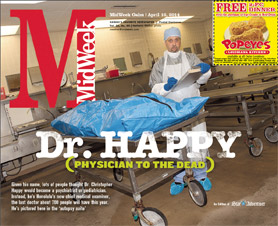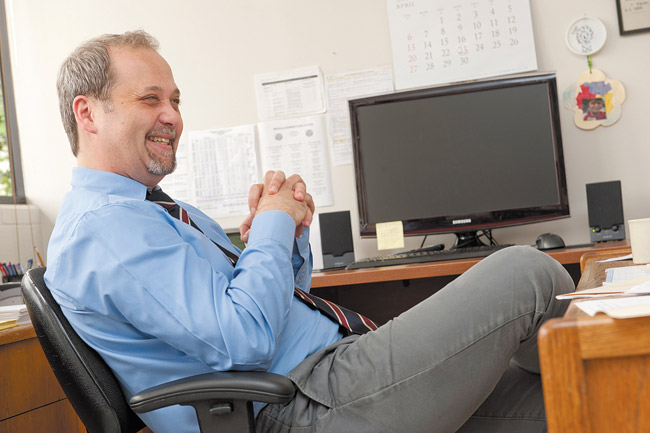Dr. HAPPY (Physician To The Dead)
Given his name, lots of people thought Dr. Christopher Happy would become a psychiatrist or pediatrician. Instead, he’s Honolulu’s new chief medical examiner, the last doctor about 700 people will have this year
Some people’s names seem to predestine their careers, like baseball players Prince Fielder and Homer Bailey, or the lightning-fast hockey goaltender Jonathan Quick.
Then there is our new chief medical examiner, Dr. Christopher Happy, a name so obviously ironic that even young adult authors shudder at the thought of it.
mw-cover-041614-dr-christopher-happy-2
“I give lectures where I say I am Dr. Happy, the most ironically named medical examiner in the country, and that gets a few chuckles,” says Happy from his office in Iwilei, which conversely is an appropriately named place for a morgue.
“People think I should have been a pediatrician, anesthesiologist or psychologist – any of these would have been more fitting. Maybe it was my name that subconsciously drove me to forensic pathology. To be pigeonholed as a psychologist would have been too easy.
“I get two reactions – mostly it’s positive, people like my name. But very rarely it is negative – people have different reactions to grief, and they think it is ironic or inappropriate. I have had one or two in my 12-year career say, ‘That is terrible, I can’t believe your name is Happy.’ What can I say? I didn’t have a choice.”
However it influenced his career choice, the people of Honolulu are blessed to have him after nearly four years of the position being vacant. There are fewer than 1,000 board-certified forensic pathologists in the United States, and the city finally realized that our weather was not enough to attract one to the Islands, so they raised the salary to the industry standard $250,000 level.
The reason there are so few forensic pathologists is the obvious one. A doctor’s whole mission learned through medical school is to keep the patient alive – when they lose one, it is considered a failure, to a certain extent. So having every patient already deceased takes a toll on one’s soul.
“These days people don’t like to think about death, unless you are Goth, but I deal with death a lot,” says Happy, whose office, he estimates, will perform 700 autopsies this year. “So I try to understand not just the medical part of it, but the sociological part of it, the psychological part of it; I have to deal with it every day mentally, emotionally.
“You will hear medical examiners who will say it is a job just like any other job, and that is true to some extent. But there is no way, if you are a living, breathing, feeling human, that you can’t internalize some of that, and so you need to find ways to be healthy and not be a morbid bastard all the time thinking humanity is doomed.”
One of his coping methods is common among his ilk: collecting old medical instruments. He has an old speculum on display in his office, and procures books and art that portray the skeleton as an aesthetically pleasing thing rather than something to cause shudders.
“We talk to each other a lot – it is a very close community,” says Happy, whose best friend is a forensic pathologist in Queens, N.Y. “A lot of it is humor – you have to laugh about things; you have to try to turn it into something that is digestible, otherwise I would be paralyzed with sadness sitting here all day sobbing at my desk. There is some element of graveyard humor to the whole thing, obviously in the appropriate situation.”
Not everything can be laughed off, however. Although most of the bodies he deals with belong to elderly people whose time had come, there are the ones who were taken way too young, and they really stick with him.
“The hardest for me are teenagers who commit suicide. I was a pretty depressed teenager and made it through,” says Happy, who went to high school in California and Rhode Island. “When I see teens and the story is, ‘Just broke up with boyfriend or girlfriend,’ if you would have just waited two more weeks you would have had a new one.”
Emotions aside, his job is crucial to the community and must be done with a clear head. In extreme cases, such as murders, he may be the most important witness the prosecution can have, giving vital information about how the victim died, along with the trajectory and range in which the wounds were inflicted.
Many times these autopsies and their tests take months to complete because Happy and his team must be sure about exactly what they are going to testify on in court. But even in more common cases, such as when a grandfather dies unexpectedly, the report they generate is just as crucial to the families.
“Death certificates are very important. They might, arguably, be more important than birth certificates. You can’t get your benefits without a death certificate; things cannot be adjudicated without them,” says Happy, who received his M.D. from St. Louis University. “They don’t ask to look at your birth certificate for your insurance policy, but they do want to see, at the end of your insurance policy when they pay out, what your death certificate says.”
Providing this for families is how a man who only treats the dead remains connected to those who live on.







